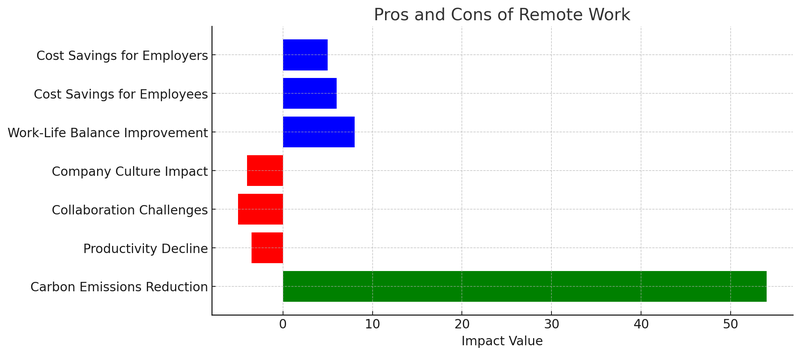Remote Work Debate: Balancing Productivity, Employee Well-being, and Environmental Benefits
Input
Changed
In recent years, remote work has been a contentious issue, with numerous employers expressing frustration regarding its perceived drawbacks. Some contend that remote work undermines company culture, hinders collaboration, and reduces productivity. However, others emphasize its advantages, such as improved work-life balance, cost savings, and substantial reductions in carbon emissions.

Some governments, including the United States under Donald Trump's leadership, are advocating for the return to full-time office work, particularly in the federal workforce, despite these ongoing debates. This essay will investigate the primary reasons why numerous employers are opposed to remote work, evaluate its advantages and disadvantages, and contend that, despite legitimate concerns regarding productivity and collaboration, remote work provides an undeniable advantage in terms of its ability to mitigate carbon emissions. The essay will also analyze the Trump administration's endeavors to reestablish in-office work for government employees, with a focus on the more extensive implications of this policy change.
Employers' Primary Reasons for Opposing Remote Work
A growing number of employers are expressing dissatisfaction with remote labor. Their frustration is primarily motivated by four primary factors: the obstacles in collaboration, perceived declines in productivity, the challenges in training new employees, and concerns over company culture and employee loyalty.
Challenges in the Onboarding and Training of New Employees Employers contend that in-person work is indispensable for the effective onboarding and training of new employees, particularly those in subordinate roles. In a physical office, employees can acquire knowledge through informal mentorship, immediate feedback from supervisors, and observation. Nevertheless, remote work restricts these opportunities, which complicates the process of assimilating new employees into the corporate culture and workflows of the company. Professional relationships, which are essential for job satisfaction and career advancement, can also be impeded by the absence of face-to-face interaction.
Perceived Decrease in Productivity Remote work may result in a decrease in productivity, which is one of the most compelling arguments against it. In comparison to their in-office colleagues, certain studies indicate that remote workers accumulate fewer hours. Remote employees work an average of 3.5 hours less per week than their office counterparts, as indicated by the American Time Use Survey. Some employers are also concerned about the potential for inefficiency due to diminished accountability and distractions at home.
Challenges in Innovation and Collaboration Numerous business executives are of the opinion that brainstorming and innovation are significantly enhanced by in-person interactions. In an office environment, employees have the opportunity to engage in creative discussions, solve problems collaboratively, and exchange ideas on a spontaneous basis. In a virtual environment, these interactions are frequently challenging to replicate, as scheduled video calls substitute organic, real-time conversations. Innovation and problem-solving efficiency may be impaired by the absence of face-to-face interaction.
Decrease in Employee Loyalty and Company Culture Another significant issue is that remote work undermines employees' commitment to their organization. Employees may experience a diminished sense of connection to their colleagues and the company's values in the absence of consistent in-person interactions. This dearth of engagement has the potential to result in decreased employee loyalty and increased turnover rates. Employers are concerned that the absence of a robust company culture may result in a higher likelihood of employees leaving their positions in exchange for marginal salary increases, which could disrupt the overall stability of the workforce.

The Benefits and Drawbacks of Remote Work
Although these apprehensions are legitimate, remote employment also offers substantial advantages that should not be disregarded.
Advantages of Remote Employment:
1.) Enhanced Work-Life Balance and Flexibility
Remote work enables employees to more effectively manage their schedules, thereby reducing tension and enhancing their overall well-being. Workers have additional time to engage in personal responsibilities, family activities, and leisure activities when they do not have to commute for extended periods of time.
2.) Employers and Employees Experience Cost Savings
Companies can decrease overhead costs associated with office space, utilities, and maintenance, while employees save money on commuting, professional attire, and dining.
3.) Access to a More Diverse Talent Pool
Companies are able to recruit talent from a variety of geographic locations through remote work, which expands their access to experienced professionals and promotes workplace diversity.

Drawbacks of Remote Employment:
1.) Absence of In-Person Communication
It is impossible for virtual communication tools to entirely supplant in-person interactions, which can have a detrimental impact on team cohesion and collaboration.
2.) Enhanced Risk of Employee Isolation
The morale and productivity of remote workers can be adversely affected by the feelings of loneliness and disconnection they experience from their teams.
3.) The Dissolution of Work-Life Boundaries
Burnout can result from the absence of clear distinctions between work and personal life, as employees may find it challenging to disconnect after working hours.

The Undeniable Advantage of Remote Work and Carbon Emissions
One of the most compelling arguments in favor of remote work is its environmental impact, despite the drawbacks. People who work from home full-time reduce their carbon emissions by 54% in comparison to those who commute to an office daily, as per a study published in The Guardian. The primary reason for this decrease is the decrease in transportation emissions, which is primarily attributable to the fact that fewer employees are driving or utilizing public transportation.
Even hybrid work models, which involve employees dividing their time between the office and their homes, contribute to the reduction of carbon footprints. The lighting, heating, and conditioning systems of offices are energy-intensive. Companies can further benefit the environment by reducing their overall energy consumption by reducing the number of personnel present at any given time.

The Trump Administration's Initiative to Restore Office Work
The Trump administration has advocated for the return to in-office work, particularly within the federal government, in contrast to the increasing recognition of the environmental benefits of remote work. Elon Musk was appointed by President Trump to oversee the Department of Government Efficiency (DOGE) in November 2024. The primary objective of DOGE is to reduce government spending and streamline federal operations.
One of DOGE's initial initiatives was to require federal employees to resume full-time, in-office employment, thereby eliminating the possibility of remote work. The administration perceived this as a means of promoting voluntary resignations, thereby reducing the size of the federal workforce. Nevertheless, this decision has raised a substantial amount of controversy. Critics contend that the majority of federal offices are inadequately equipped to accommodate all employees simultaneously, resulting in inadequate working conditions and congestion.
Additionally, the cessation of remote employment has prompted ethical and legal inquiries. The federal worker buyout program has been temporarily suspended as a result of legal challenges by Democratic state attorneys general and unions. Employees who had adapted their lifestyles to accommodate remote work are now faced with the decision of either leaving their employment or complying with the new mandate.

Conclusion
In conclusion, the debate regarding remote employment is intricate, with compelling arguments on both sides. There are valid concerns regarding productivity, collaboration, and company culture among employers. Nevertheless, remote work provides a plethora of benefits, including a more expansive hiring pool, cost reductions, and an enhanced work-life balance.
The function of remote work in reducing carbon emissions is perhaps the most significant and undeniable benefit. It is essential to take into account sustainable workplace policies as the world continues to struggle with climate change. Although the Trump administration's decision to terminate remote work for federal employees may be consistent with cost-cutting and workforce reduction strategies, it fails to consider the long-term environmental advantages that remote work offers..
A balanced approach that takes into account the broader societal benefits of remote work and the concerns of employers is imperative as organizations and governments navigate the future of work. Hybrid models, enhanced remote collaboration tools, and flexible work policies may provide a compromise that is mutually beneficial for both employers and employees, while also contributing to global sustainability initiatives. Ultimately, the discourse regarding remote work should not be limited to the immediate business requirements; it should also consider the long-term environmental and social consequences.





















